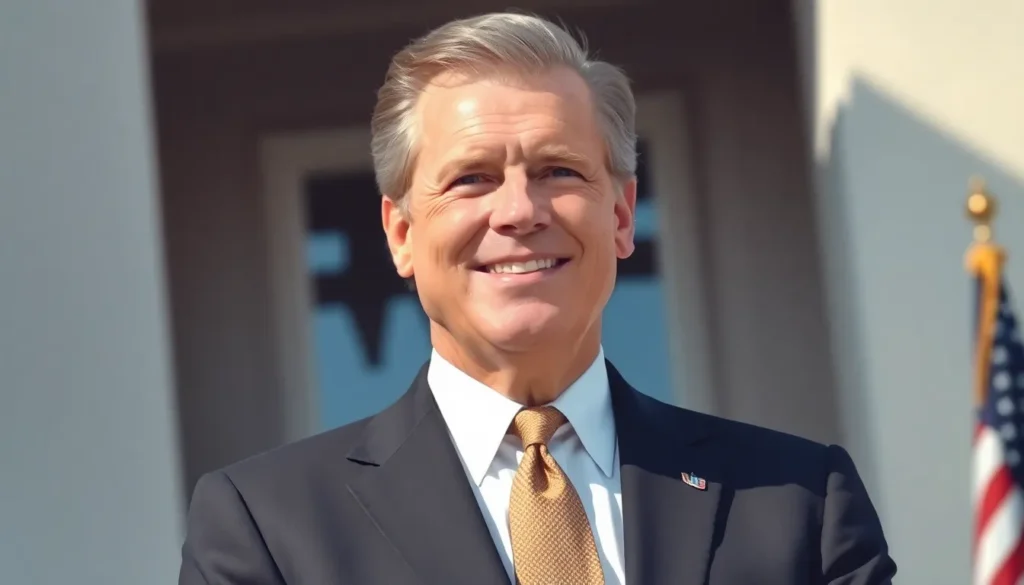Table of Contents
ToggleIn the whirlwind of American politics during the early 1970s, Gerald Ford’s appointment as vice president raised more than a few eyebrows. Picture this: a nation grappling with scandal, uncertainty, and a hefty dose of political drama. When Spiro Agnew decided to take an unexpected exit, the search for a new second-in-command began. Enter Ford, a man whose charm could make even a budget meeting feel like a party.
Ford wasn’t just a man in the right place at the right time; he brought a unique blend of experience and integrity to the table. His appointment wasn’t just about filling a seat; it was about restoring faith in a shaken government. Curious about the backstory behind this pivotal moment? Buckle up as we dive into the twists and turns that led to Ford’s unexpected rise to the vice presidency.
Context of Gerald Ford’s Appointment
Gerald Ford’s appointment as vice president arose during a critical period in American politics. Spiro Agnew resigned on October 10, 1973, amid allegations of tax evasion and corruption. Richard Nixon faced immense pressure following the Watergate scandal, leading to a crisis of confidence in the government.
With Agnew’s departure, Nixon sought a candidate who could unify the party and reassure the public. Ford’s selection on November 27, 1973, marked him as the first vice president selected under the 25th Amendment. This amendment allowed for the appointment of a new vice president if the position became vacant.
Political experience played a significant role in Ford’s selection. As a long-time congressman and the House Minority Leader, he was well-respected within the Republican Party. His ability to connect with both parties made him an ideal candidate to bridge political divides.
Integrity was a key factor in Ford’s appointment. The nation needed a leader who could help restore public trust amid ongoing scandals. Ford’s reputation for honesty and straightforwardness positioned him as a trustworthy figure during tumultuous times.
Nixon’s own fading popularity also influenced the decision. As public approval ratings declined due to Watergate, appointing an honorable vice president became crucial for maintaining some level of confidence in the administration. Ford’s character provided a reassuring contrast to the political turmoil of the era.
The Political Landscape of the 1970s

The early 1970s presented a turbulent political arena in the United States. Several significant factors contributed to the climate surrounding Gerald Ford’s vice presidency.
The Nixon Administration’s Challenges
Nixon faced immense obstacles during his presidency. The Watergate scandal severely impacted public trust in government. As investigations unfolded, they revealed misconduct among administration officials, culminating in Spiro Agnew’s resignation. Agnew stepped down due to tax evasion and corruption allegations. These events created a vacuum, prompting the need for new leadership. Ford’s appointment aimed to restore faith in the administration’s integrity and stability. His selection signaled a shift towards transparency in a time of deep mistrust.
The Role of the Vice Presidency
The vice presidency held a unique significance during this politically charged period. It became essential for reinforcing executive stability. Ford’s appointment marked the first use of the 25th Amendment, establishing a precedent for future vacancies. The role required someone capable of connecting diverse political views. Ford’s extensive background as a congressman and House Minority Leader positioned him well for this challenge. Appointing a figure like Ford aimed to unify Democrats and Republicans in a divided Congress. His honesty and approachability further enhanced his suitability to navigate complicated political waters.
Reasons Behind Ford’s Selection
Ford’s selection as vice president stemmed from a combination of political acumen and a pressing need for stability during a tumultuous era.
Political Experience and Reputation
Gerald Ford brought extensive political experience to the table. His tenure as a congressman and House Minority Leader showcased his ability to navigate complex legislative landscapes. Ford maintained a reputation for honesty, which resonated with a public weary of political scandal. His straightforward demeanor appealed to both Republicans and Democrats. This bipartisan appeal positioned him as a candidate who could foster collaboration and dialogue in a fractured political environment. Ford’s integrity convinced many that he could restore trust in government.
The Need for Unity in the Republican Party
Unity within the Republican Party emerged as a critical concern during Ford’s appointment. Following Spiro Agnew’s resignation, divisions within the party amplified. Leaders recognized the necessity for a candidate who could mend fractures and heal rifts. Ford embodied the qualities that many believed could unite the party; his moderate stance attracted various factions. He became a unifying figure, intended to rally support amidst the party’s internal struggles and external challenges. This need for cohesion highlighted the strategic nature of Ford’s vice presidential appointment.
Implications of Ford’s Appointment
Ford’s appointment as vice president significantly influenced the political landscape during a time of uncertainty. His selection, the first under the 25th Amendment, established a precedent for future presidential successions.
Impact on Presidential Succession
The 25th Amendment clarified procedures for filling vacancies in the vice presidency. Ford’s situation set a historical marker, illustrating how the amendment could provide stability during a crisis. By demonstrating that a seamless transfer of power is possible, it offered assurance to a nation grappling with political turmoil. The success of Ford’s appointment highlighted the importance of choosing a suitable candidate who could unite a divided Congress, fostering a more stable political environment for successors.
Ford’s Influence on Future Vice Presidents
Ford’s term as vice president shaped the expectations for future officeholders. Transparency and integrity became critical traits emphasized during his tenure. His bipartisan approach encouraged subsequent vice presidents to cultivate collaboration across party lines. Ford’s example reinforced the notion that vice presidents could play essential roles in both legislative support and crisis management. This influence altered how future candidates viewed their responsibilities and potential impact on national governance.
Gerald Ford’s appointment as vice president was a pivotal moment in American political history. His selection not only filled a vacancy but also aimed to restore faith in a government shaken by scandal. Ford’s ability to connect with both parties and his reputation for integrity made him an essential figure during a time of uncertainty.
His leadership style and commitment to transparency set new standards for the vice presidency. By bridging divides and fostering collaboration, Ford’s tenure influenced future officeholders and reshaped expectations for the role. Ultimately, his appointment marked a significant step toward stabilizing a nation in turmoil and established a legacy that would resonate through subsequent administrations.







